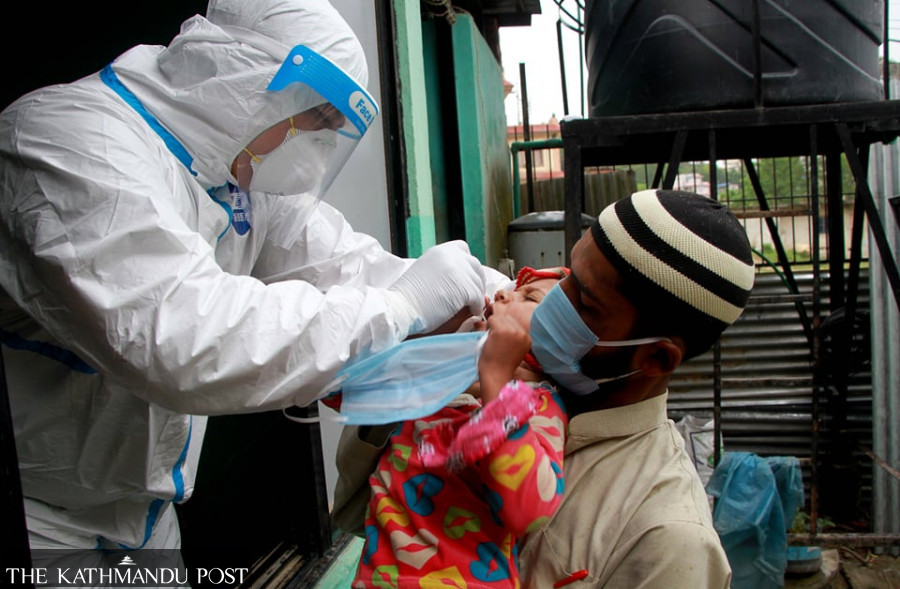Health
10,000 health workers being trained on paediatric care as threat of third virus wave looms
Officials say children could be at risk if a third coronavirus wave strikes since children do not follow safety measures properly and have not been vaccinated yet.
Arjun Poudel
Amid speculations that the third wave of the Covid-19 pandemic may affect the children more, over 10,000 health workers including consultant doctors, medical officers, paramedics and nurses will be provided with paediatric training to deal with the third wave of the pandemic.
Child health experts, however, said there is no proof or study report to substantiate the claim that the third wave of the pandemic will affect children more, but said preparing for any such eventualities is good.
“We are preparing to impart training to over 10,000 health workers including doctors and paramedics from next week,” Dr Prakash Budhathoki, senior consultant at Curative Service Division of the Department of Health Services told the Post. “The World Health Organisation Nepal will provide technical support to the government to impart the training.”
The training will be imparted virtually for 10 days to the health workers serving in both state-run and private health facilities. It will include basic training to manage infected children. Health workers can participate in the training from their respective health facilities.
“Health workers will be provided training on the use of paediatric health equipment and medicines among other things,” said Budhathoki.
Even though new coronavirus cases have receded in recent days, a group of experts in India have said a third wave is imminent.
According to Budhathoki, secretary at the Ministry of Health Laxman Aryal called officials at the Curative Service Division and directed them to make preparations for the training.
Earlier, on June 5, the Health Ministry had issued a circular directing all hospitals across the country to reserve 20 percent of their beds for children, saying that a third wave could affect children more.
“It is good that the government has decided to provide paediatric training to health workers and set up infrastructure,” Dr Sujit Shrestha, a consultant paediatrician, serving at Om Hospital told the Post. “It’s a good investment for future pandemics.”
In the first wave of the pandemic last year, elderly people were more affected and during the ongoing second wave more youths have been infected.
Officials at the Health Ministry say children could be at risk if a third wave strikes as children do not follow safety measures properly and have not been vaccinated yet.
“Moreover, more children in South Asia are malnourished and assumptions might have been made that if they get infected with the coronavirus they could suffer more,”Dr Ram Hari Chaulagain, treasurer of the Nepal Paediatric Society, told the Post. “ But there is no scientific evidence that children will suffer more in the third wave of infection. Children will definitely suffer but around the same proportion as other age groups.”
In Nepal’s case, the number of children affected during the second wave was more compared to the first wave. But the rise in infections among children was attributed to the government’s reluctance to close schools on time.
Last year, the entire country went into a lockdown quite early–from March 24 when there was just one active case. The lockdown continued until July 21. But schools did not open immediately, as the number of cases had crossed the 17,000 mark despite the lockdown. After the infections peaked in October, the country, however, started to witness a dramatic decline in the number of new daily cases.
Meanwhile, the government has approved a proposal to add 260 intensive care unit beds at central, provincial and district hospitals across the country targeting children aged below 18 years.
According to Phanindra Giri, an official at the information technology section of the Health Ministry, the Finance Ministry has endorsed the proposal to protect children from the potential third wave.
According to the Health Ministry, 195 intensive care unit beds meant for children will be added in federal government-run hospitals such as Kanti Children’s Hospital, Sukraraj Tropical and Infectious Disease Hospital, Bir Hospital, Patan Hospital and Bharatpur Hospital among others and the rest of the beds will be added at provincial and district hospitals.
“The Finance Ministry has approved a budget of Rs330 million for procuring the intensive care unit beds,” said Giri.
The Health Ministry has also assured funds to the hospitals for procuring intensive care unit and high dependency unit beds.
Dr Guna Raj Lohani, chief of policy, planning and monitoring division at the Health Ministry said that the ministry has instructed government-run hospitals to make necessary preparations to add intensive care unit and high dependency unit beds for children with finding assurance.
“The beds will be added in the pediatric wards of the hospitals,” he said. “We have asked them to ready the beds by mid-July.”
Krishna Prasad Paudel, spokesperson at the Health Ministry told the Post last week that besides the fact that children are more vulnerable to Covid-19 infection as they are not vaccinated, the country lacks enough health facilities dedicated to children.
“So far, most of the Covid-19 related to health facilities have been prepared by targeting the adult population,” said Paudel, who is also director at the Epidemiology and Disease Control Division. “So, besides arranging beds, efforts have been made to procure medical equipment, which are compatible for children, such as ventilators and equipment that help deliver oxygen.”
(Prithvi Man Shrestha contributed reporting.)




 11.84°C Kathmandu
11.84°C Kathmandu















